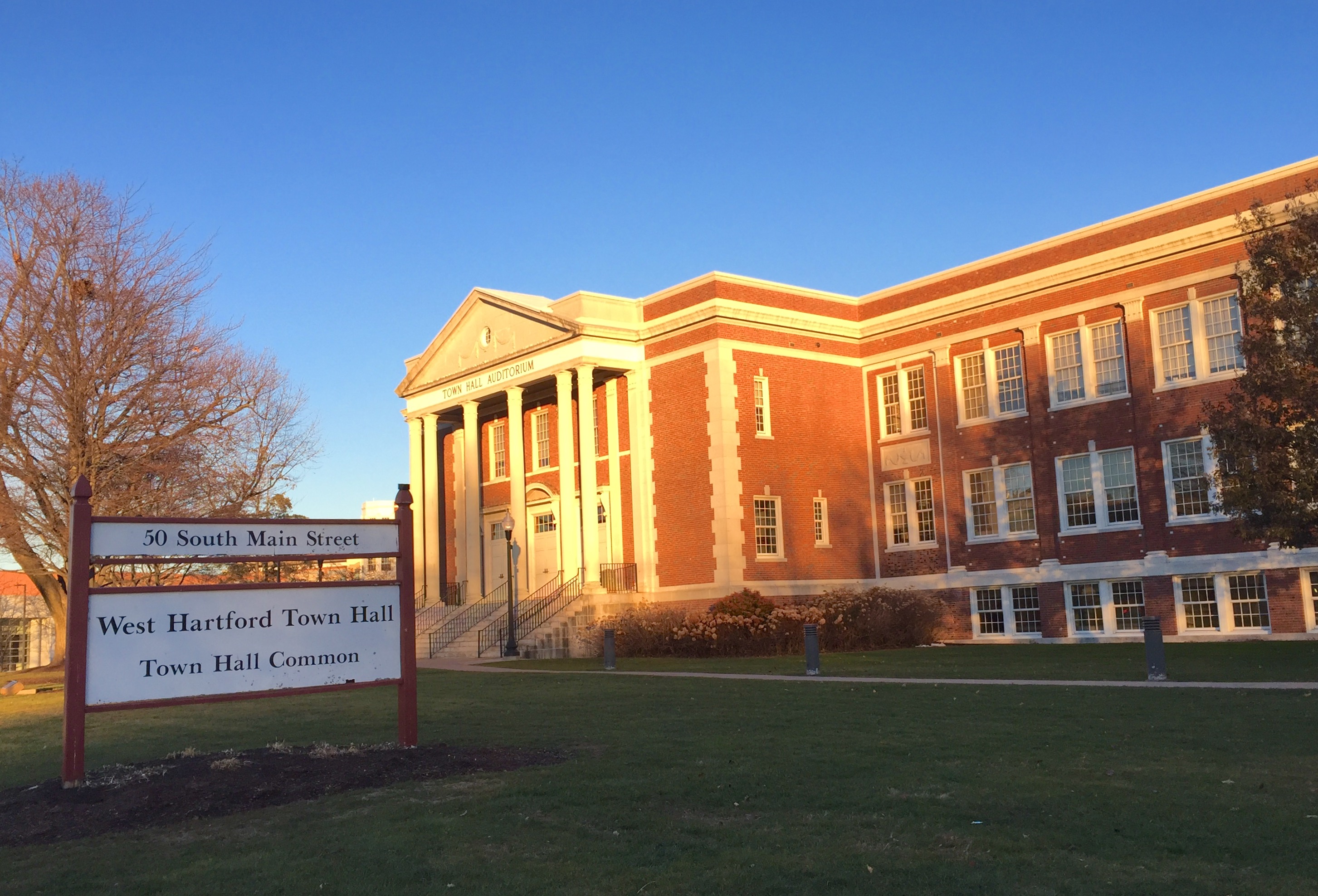West Hartford to Delay Budget Approval Process

Audio By Carbonatix

West Hartford Town Hall. Photo credit: Ronni Newton
Gov. Ned Lamont has empowered town leaders to adopt budgets without going before voters, or to delay the process.
By Ronni Newton
One component of Executive Order 7I, issued Saturday by Gov. Ned Lamont, waived the long-standing requirement for municipalities to hold town meetings to adopt their budgets for FY2021, adding to relief granted in a previous executive order that allowed the budget process to be extended amid the coronavirus crisis.
West Hartford will opt to extend the process, and involve the public in the process to the extent possible through virtual meetings, Mayor Shari Cantor said Sunday.
“Public access and open government are core West Hartford values. As mayor, I remain committed to holding two public hearings to allow public testimony on the budget, as required by the Town Charter,” Cantor told We-Ha.com. “Testimony will still be received in real time, but we will likely use a remote format to protect the health of our residents, staff and elected officials.”
Town Hall is closed to the public but operating in virtual mode, and will continue in that manner until further notice amid the COVID-19 pandemic, but Cantor said the Town Council and town staff are committed to maintaining a transparent process for budget discussions.
Town Manager Matt Hart presented West Hartford’s FY2021 budget March 10, and the first budget hearing was scheduled for Tuesday, March 24 at 2 p.m. That has been canceled, as have a regular Town Council meeting and non-budget-related hearing that were scheduled for Tuesday night. A public hearing on the proposed Board of Education budget was scheduled for Wednesday, March 25.
Information with new dates, and details about the manner in which public participation will take place, will be forthcoming.
“We appreciate Governor Lamont’s decision to extend municipal budget deadlines,” she said. “During this time of crisis, it’s important that we have additional time to create a budget that is strategic, thoughtful, and responsive to the enormous economic impact of COVID-19 on our community.”
What does the order mean for towns
The executive order to eliminate the need for town meetings affects more than two-thirds of Connecticut’s 169 cities and towns. In these communities it gives the Board of Selectmen – and not a town meeting or a referendum – final authority to approve spending levels and local mill rates.
“Just as my administration is working tirelessly to protect the health and safety of Connecticut residents, so to are our local mayors and first selectmen,” Lamont said. “During this unprecedented public health pandemic, it’s vital that we provide our local leaders with procedural relief.”
The governor’s order quickly generated praise from the Connecticut Council of Small Towns and the Connecticut Conference of Municipalities, who called it a crucial step to avert fiscal chaos at the local government level.
“This will allow towns to adopt budgets and set mill rates which are critical to funding the delivering of local services,” said COST Executive Director Betsy Gara, who acknowledged that while the step is unprecedented, “clearly protecting the health and safety of the public is town officials’ Number One concern.”
Gara also predicted this order would leave municipalities in the best position, once the public health crisis has ended, to help residents return to work and to reopen public schools. “We want to make sure when this is over we can get back on track quickly.”
Joe DeLong, executive director of CCM, said the administration did not act in a vacuum, working closely with municipal advocates and experts in municipal law.
“A lot of people were able to provide input on this process,” DeLong said. “It’s probably not perfect and will probably require some modifications in future executive orders if we find anything we missed, but generally this is something we support and are appreciative of.”
The governor’s order also directs local leaders to make options available for the public to inspect and comment on the budget remotely. This would involve posting the budget on town websites and allowing residents to submit comments on these fiscal plans by email.
Local leaders have been wary since the COVID-19 crisis intensified two weeks ago that municipalities – most of which adopt budgets between late April and mid-May – would be facing fiscal chaos if they entered the new fiscal year on July 1 with no budget in place and no clear path toward approving one without jeopardizing public health.
In an earlier order, Lamont gave local leaders an additional 30 days to adopt their budgets.
In general, the final stage in local budget adoption in most Connecticut municipalities involves either a town meeting, a referendum, or both. According to COST, nearly 120 towns adopted budgets one of these two ways in 2018.
In cities and certain large towns, the legislative body designated for this task is a city council, a town council, or a representative town meeting. The latter typically involves a few dozen representatives elected from various regions of a town.
But in many cases, after a budget proposal has been prepared by a municipal boards of education, selectmen and finance, the final proposal is brought to a town meeting, at which any registered voter or property taxpayer can attend and cast a ballot.
Most communities that use the town meeting approach also allow residents, if unsatisfied with the result, to petition the budget to a referendum – a machine vote at local polling places – for final action.
And still other communities don’t even vote on the budget at the town meeting level, instead sending the matter directly to a referendum.
Lamont’s executive order empowered the boards of education for regional school districts to adopt budgets in similar fashion, without those plans having to be endorsed by voters in their respective communities.
Portions of an article by Keith M. Phaneuf and Jenna Carlesso were include in this article.
Like what you see here? Click here to subscribe to We-Ha’s newsletter so you’ll always be in the know about what’s happening in West Hartford!



